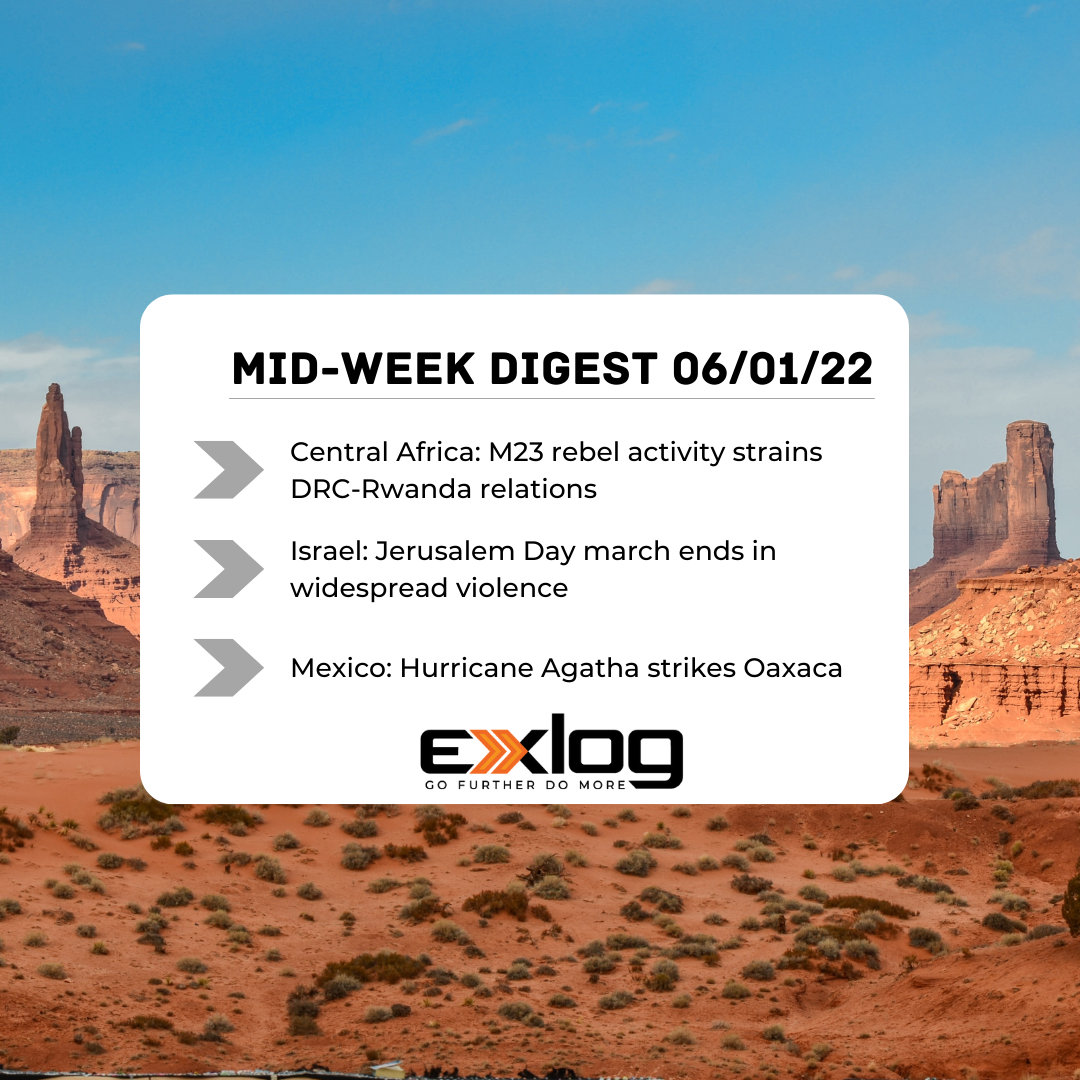Rebel group fuels DRC-Rwanda tensions, Jerusalem Day Violence, and Hurricane Agatha reaches Mexico’s Oaxaca
Central Africa: M23 Rebel Activity strains DRC-Rwanda relations
Worsening violence between Congolese forces and the March 23 Movement (M23) in the eastern Democratic Republic of Congo (DRC) have strained bilateral relations between Rwanda and the DRC and threaten to further complicate the regional operating environment. The heaviest clashes in the North Kivu region in nearly a decade have seen M23 forces target Rumangabo military base and the city of Kibumba, located near the border with Rwanda, as of late May. The M23 rebel group is primarily comprised of former Congolese army soldiers who have been operating in eastern DRC for the last two decades and staged an armed rebellion against government forces from 2012-2013. Mounting frustration among M23 members over the perceived failure of the Congolese government to uphold the terms of the 2013 peace agreement – especially its commitments to integrate rebels back into society and the army – has served as a major catalyst of the renewed violence in the eastern DRC. Congolese authorities, who claim that M23 is backed by the Rwandan government, have responded to the fighting by summoning the Rwandan ambassador and suspending RwandAir flights to the cities of Kinshasa, Lubumbashi, and Goma. Rwandan officials have denied supporting M23 and in turn accused the Congolese government of cooperating with a separate rebel group (the FDLR) that carried out a handful of recent attacks inside Rwandan territory. The deteriorating regional security situation has displaced approximately 170,000 Congolese, including 72,000 in the last week alone. Many have fled to neighboring Uganda, Burundi, and Tanzania, though these countries lack the funding and infrastructure to provide safe and sanitary living conditions for large numbers of refugees. Intensifying conflict between rebel groups such as M23 and central African governments, in the context of long-standing regional antagonism, contributes to a growing threat of border closures, flight cancellations, and other cross-border operational disruptions in the near-to-medium term.
Israel: Jerusalem Day march ends in widespread violence
Israeli-Palestinian tensions remain elevated following severe clashes in Jerusalem and the West Bank triggered by Jerusalem Day’s “flag march” on May 29. An estimated 70,000 people participated in the annual Jerusalem Day celebration, which commemorates Israel’s capture of the majority-Palestinian Old City, East Jerusalem, during the 1967 Six Days War. Participants marched through the Old City waving Israeli flags and chanting slogans such as “the nation of Israel lives” and “death to Arabs.” Clashes between Palestinian protestors, flag march participants, and security forces occurred along the route, especially at Damascus Gate. Violence also broke out at the Temple Mount compound, where Palestinian activists inside the al-Aqsa Mosque threw rocks and fireworks as thousands of marchers entered the complex, waved flags, and prayed publicly. Such displays inside the Temple Mount are rare and violate the status quo agreement that states Jews can enter the site but are not permitted to pray. Security forces deployed crowd control methods, including stun grenades, pepper spray, and rubber bullets to disperse the protestors and counter-protestors. The Red Crescent claims that least 81 Palestinians and five security officers were injured in Jerusalem, along with more than 100 people in several West Bank towns where clashes were also reported following Jerusalem Day events; there are also reports that several of these injuries were caused by live ammunition. The Israeli government has condemned the violence, which it blamed on two far-right anti-Arab groups: La Familia and Lehava. Jerusalem Day events have long been considered provocative and historically served as a flashpoint for violence – including in 2021, when they sparked a brief 11-day war between Israel and Gaza-based militants. This year’s unrest comes on the heels of renewed sectarian violence in Jerusalem and the West Bank in April (during Ramadan), as well as several terrorist attacks against Israeli targets. The security situation will likely continue to deteriorate in the near term, as both sides have historically engaged in tit-for-tat retaliation after violent protests.
Mexico: Hurricane Agatha strikes Oaxaca
Hurricane Agatha made landfall as a Category 2 storm in southern Mexico’s Oaxaca state on May 30, triggering widespread flooding, landslides, and power outages. At landfall, Agatha’s wind speed reached 105 mph (169 kph), making it the strongest May hurricane to reach Mexico’s Pacific coast in decades. As of June 1, 11 people have died and 33 others are missing due to flash floods and mudslides. Most of the casualties were concentrated in several small towns in mountainous inland areas, with the municipality of Santiago Xanica witnessing the most destruction. The storm also caused severe infrastructure damage throughout the state, destroying several bridges, major highways, and local roads, and causing telecommunication disruptions. In preparation for the storm, Mexican authorities closed schools in the Costa and Sierra Sur regions of Oaxaca, though normal operations are expected to resume on June 2. State officials have also activated 203 temporary shelters with the capacity to accommodate 26,000 people displaced by the storm. More than 72,000 people have experienced power outages in the municipalities of Santa María Tonameca, Huatulco, San Mateo Piñas, and San Agustín Loxicha, although electricity has been restored in 55% of the affected households. Power outages were also reported in the neighboring state of Veracruz, south of the state’s capital Xalapa, where electrical services have been fully restored. The National Hurricane Center announced that the low-level center of the storm had dissipated as of May 31, but torrential rains from the hurricane’s remnants will likely persist in Oaxaca, Veracruz, Chiapas, Tabasco, Campeche Yucatán, and Quintana Roo in the coming days. Agatha’s remnants are forecast to merge with a low-pressure system over Central America and southeastern Mexico, bringing strong winds, coastal flooding, and heavy rains to the Bahamas, Cuba, and parts of Florida by the end of the week.


